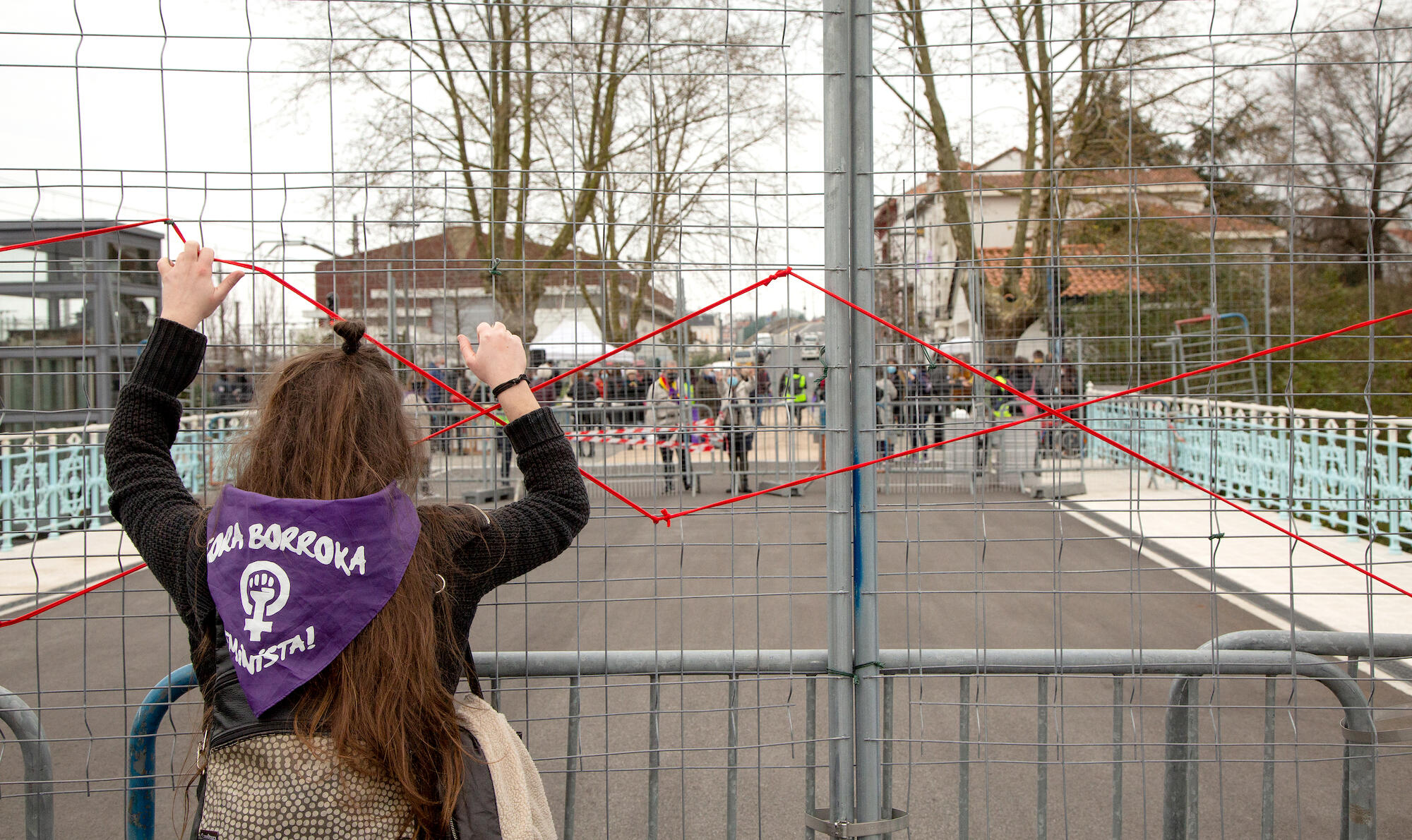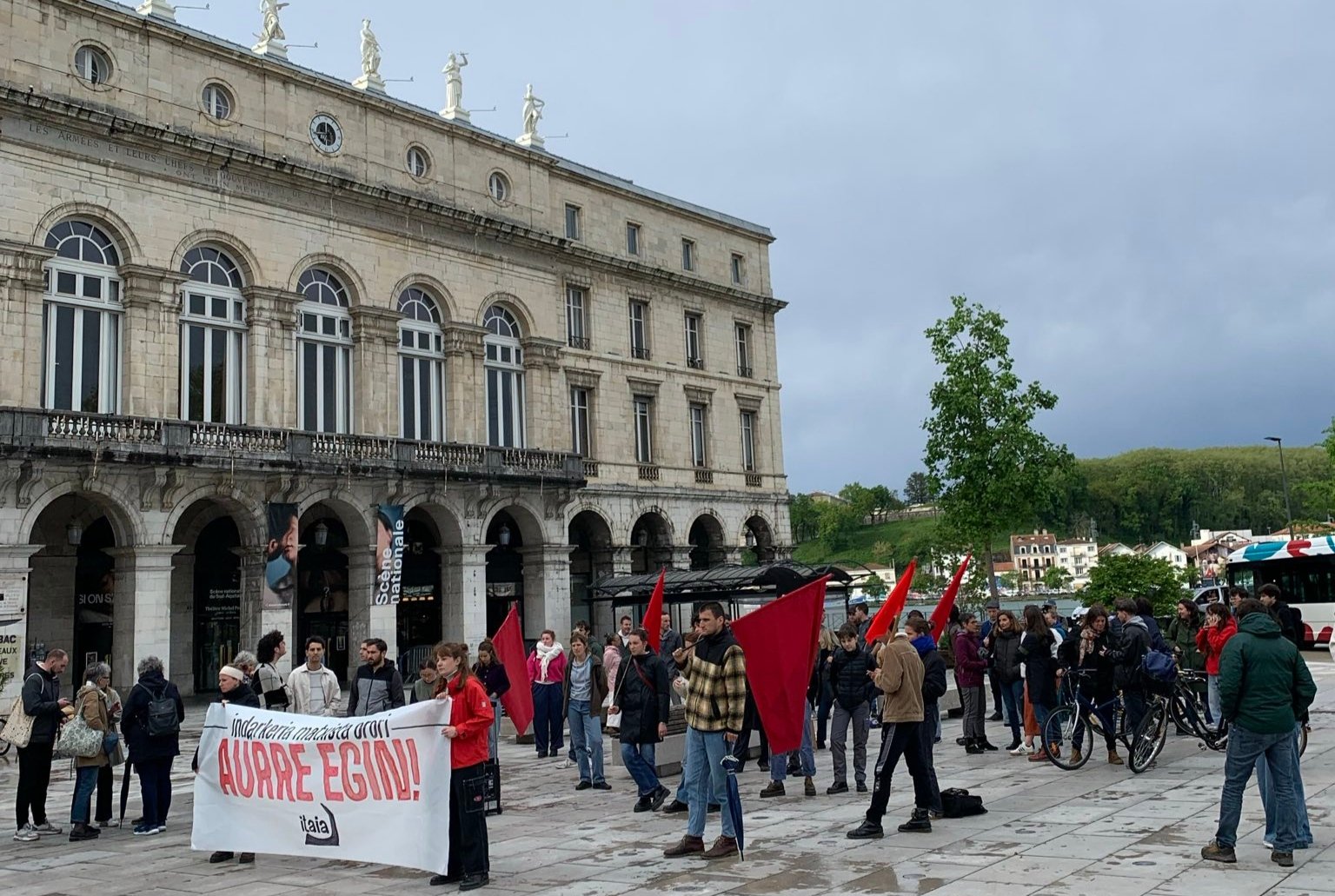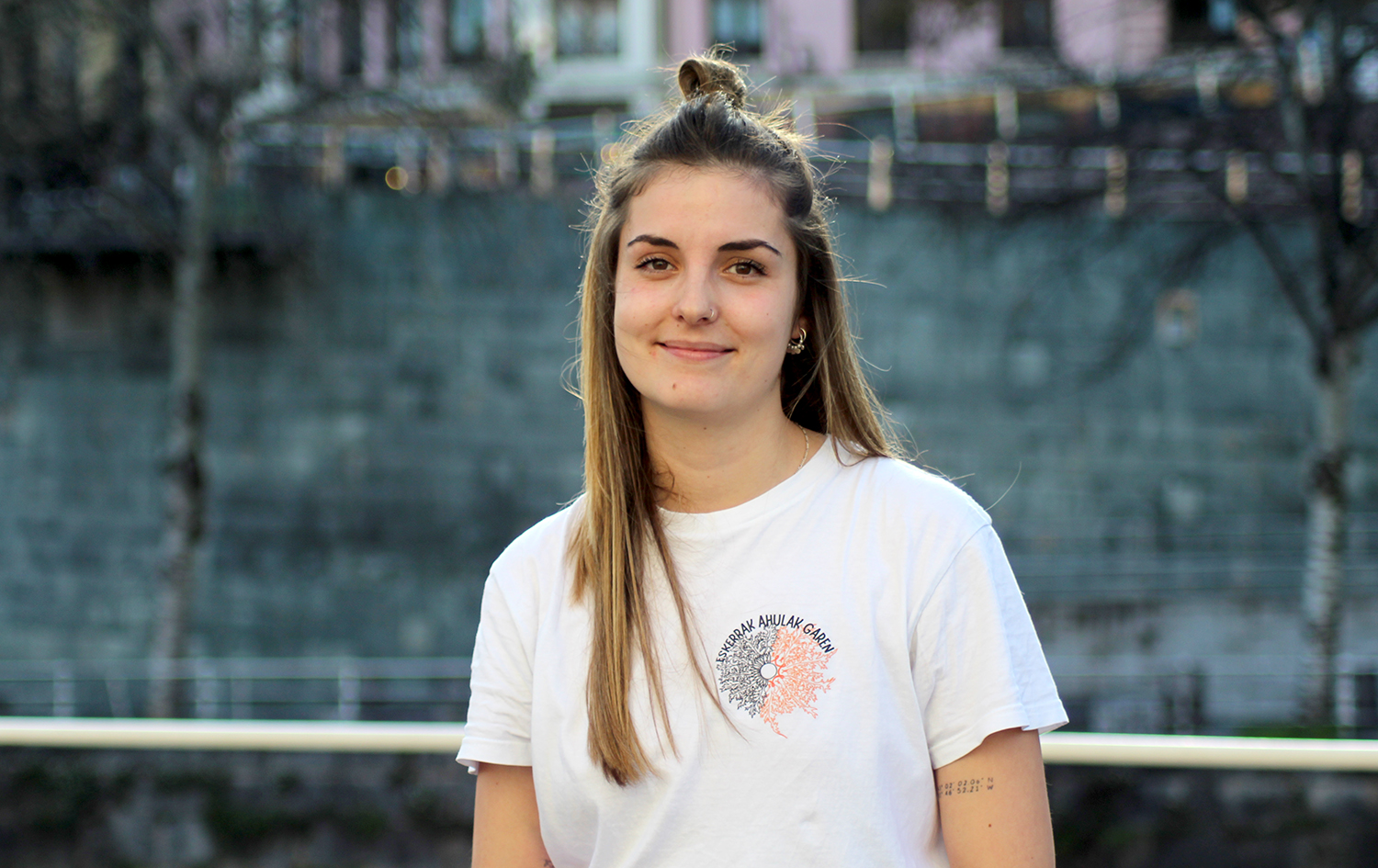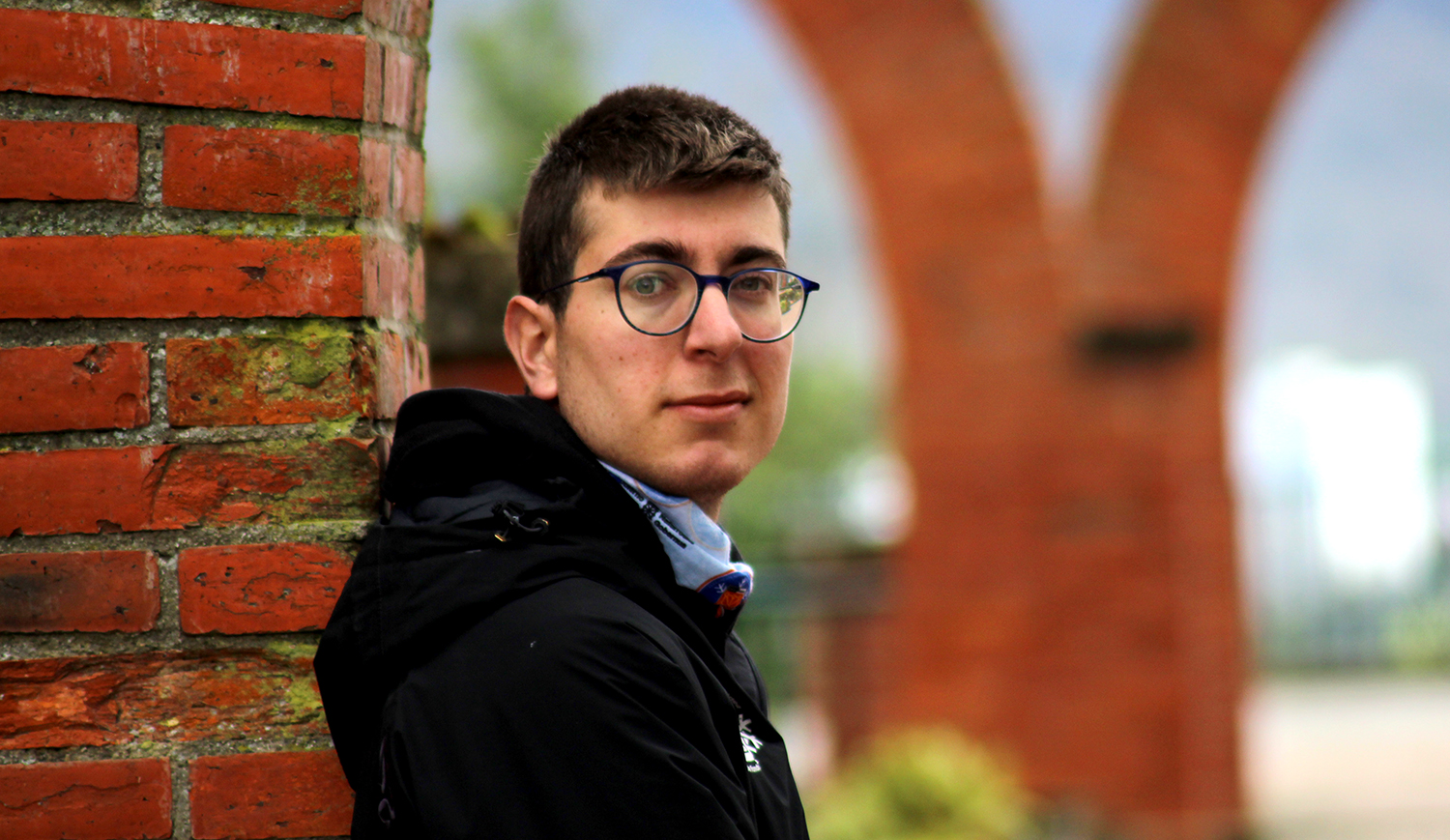"We want to radically break down the walls of the current system"
- The radio program and magazines Ivy/Huntza will disseminate in four written issues and six sound spaces the values and ideas of the transfeminist movement Mundubat.

The route progresses, the call is interrupted as it passes through the tunnels, as the road is not interrupted. Like the roads of the Mundubat Foundation. Once sown, the seeds are intended to be rooted in the media. Txefi Roco (Salta, Argentina, 1979) is one of the members behind the newborn radio program and the transfeminist magazine Ivy/Huntza. With feminism as a center, magazines and radio programs will bring to light many issues surrounding it. The magazine will have four copies, one for each season of the year, and they have already made their first issue. The first programme has been recorded in the studies of the radio station Hala Bedi in Vitoria-Gasteiz.
How did this new Huntza project come about?
Many of Huntza’s members are close to the first feminist economics school we organized in 2014. In the women's house named Marienea, we started to get together in Basauri (Bizkaia), and in 2016, since the Mundubat Association, we saw the opportunity to start working not only the feminist economy, but also the care economy. We hold workshops and training activities in Bilbao and Donostia. From there, the possibility of creating this project was raised. That's where the radio and the transfeminist magazine Huntza come from.
Where does Huntza's name come from?
We talked a lot about that name, and we almost killed ourselves. But it's not silly for us to choose the name, because after all, it also represents where you put the focus. Ivy is a seemingly weak plant, but its roots can reach places where land, water or air does not reach. They go through cracks and walls, they last a long time. Even if they seem fragile, their strength by pulling the plant is enormous. In abandoned buildings you can see how the walls hold. The ivy widens, it overcomes all difficulty in a way. We, like ivy, want to root down the walls of the current system. In addition, as the seasons go by, the color of ivy is changing: reddish, yellowish, green… Some members say that we also have a little bit of the nature of ivy, and we really liked the metaphor.
And what were the formations you did to make a radio and a magazine?
Through schools we work a lot on the characteristic of public learning, that is, we all have something to learn, and the level of knowledge should not be the way to a social hierarchy. Sometimes there have been cases of symmetry, when someone is recognized for knowledge of a knowledge. In the project, for example, five of the seven researchers were tabernacles, no one had knowledge of the media, no one was a researcher. There were only those of us who had minimal knowledge of this area, and those of us who knew in a very vague way. But gradually we started to work, to mark an editorial line, to work on dialogue and analysis… and we worked on a collective discourse. We were all the protagonists, we all participated. We believe that some issues have been badly dealt with and that they have received some treatment. It was a challenge for us to work a narrative on the public agenda, or at least the one we would put on the table as we have lived in a precarious, migrant or vulnerable situation. On the other hand, it seems to us a good exercise to raise the voice, to internalize a critical capacity, to build one's own discourse and a capacity for reflection.
Will you work the same format in both media?
Yes, in radio programs we will work the same way we work in the magazine. We're going to do sections with the same name, and we've had a similar way to treat it, both on the radio and in the magazine. One of the objectives of the discussions that we are going to have is to show each other and to create constructive learning.
There are no articles signed in the journal. Why?
Articles and texts are written individually, in pairs or in groups, but it's true that they have anonymous writers. The text, even if it is written by these small groups, is rounded up by the large group in an assembly that we are celebrating and is a very nice exercise.
How was this practice in the first numbers and radio programs?
It was a great challenge for us, we had a lot of nervousness, someone said, “I am not able to do this.” But we started to work, to look at the newspapers, to look for ephemerides, to look for the history of March 8, to do interviews… There has been a very interesting exchange between working women who have started working from scratch and with other workers, and those approaches have been enriching, because complicity has arisen between interviewer and interviewee. At the end of the day, we knew that we had been able to move it forward. We hope to gradually make the way and gain experience. We are already shaping the second issue of the journal.
Have you noticed any difference in making the magazine radio?
The radio, on the side of the magazine, gives you the opportunity to reach those domestic workers who have the radio locked in their homes and turned on. We also want to reach them. Listening to our program, we seek to liberate their bowels so that we can once break their silence and make their problems known.
Women who live in anonymity will have their space.
Yes, whoever wants can call the program. Liz Quintana, besides being a co-worker, is a lawyer and we will count on her help in a section directed to the public. Anonymous women can raise their questions or problems, they can report any cases of rape or violence. Anyone who wants, of course, will give his name and anyone who wants not. The idea is to advise the victim how to defend themselves or how to cope with the situation. Furthermore, we would like the testimony of the victims to be used to encourage those who remain silent to tell, we believe that it is possible for women to take a step and to move from being silent to telling their problems and experiences.
How did you get this project with the Hala Bedi radio?
Our colleague Tania Cañas works as a collaborator in Hala Bedin and through her the opportunity emerged. For us, it's to be thankful, because we know how difficult it is to have a self-managed space, and Hala Bedi works this way.
Four magazines and six radio programs. And then?
For now this time [laughing]. Let's go step by step. With the first program, everyone enjoyed it. We have already published a journal issue, which can be read on the Mundubat Foundation website. We have also made podcasts, and the programme can be heard in the Basque Autonomous Community. Of course, we would like this project to be monitored on these platforms. Recordings, magazine production and, in general, the level of militancy required by this project is difficult. Many of the project members are bilbaínos and have to travel to Vitoria-Gasteiz in their spare hours to record radio programs. We don't want the project to eat our lives. For now, let's enjoy this.
Errepikatu nirekin: Sara Millerey. Ez dezagun ahaztu bere izena. Transfeminizidioaren biktima da Millerey: gorrototzaile transmisogino batek torturatu zuen, besoak moztu zizkion eta bizirik bota zuen ibaiertz batera. Bi orduko agoniaren ondoren hil zen.
Errazagoa da J.K... [+]
Many Basque feminists have been disappointed to learn that writer Chimamanda Ngozi Adichie has externalized pregnancy, meaning that a surrogate has fertilized her baby for money.Adichie is the author of the essay We should all be feminists, among others. They have ignored the... [+]
Indartsua, irribarretsua eta oso langilea. Helburu pila bat ditu esku artean, eta ideia bat okurritzen zaionean buru-belarri aritzen da horretan. Horiek dira Ainhoa Jungitu (Urduña, Bizkaia, 1998) deskribatzen duten zenbait ezaugarri. 2023an esklerosi anizkoitza... [+]
Gozamen aparta bezain deskribatzeko zaila dakar, norbaiten hitzak irakurri edo entzun ostean, zera pentsatzeak: “Horixe zen neu aurreko hartan azaltzen saiatu nintzena!”. Idazlea eta itzultzailea da María Reimóndez, eta galegoz aritzen da, hizkuntza... [+]
Orain arte desgaituak ez diren pertsonekin lehiatu da Uharteko Ipar Eski Taldeko Eneko Leyun eskiatzailea (Iruñea, 1998). 2024-2025 denboraldian, lehenengo aldiz parte hartu du Adimen Urritasuna duten Pertsonentzako Iraupeneko Eskiko Espainiako Txapelketan. Urrezko... [+]
Joan den urte hondarrean atera da L'affaire Ange Soleil, le dépeceur d'Aubervilliers (Ange Soleil afera, Aubervilliers-ko puskatzailea) eleberria, Christelle Lozère-k idatzia. Lozère da artearen historiako irakasle bakarra Antilletako... [+]





















